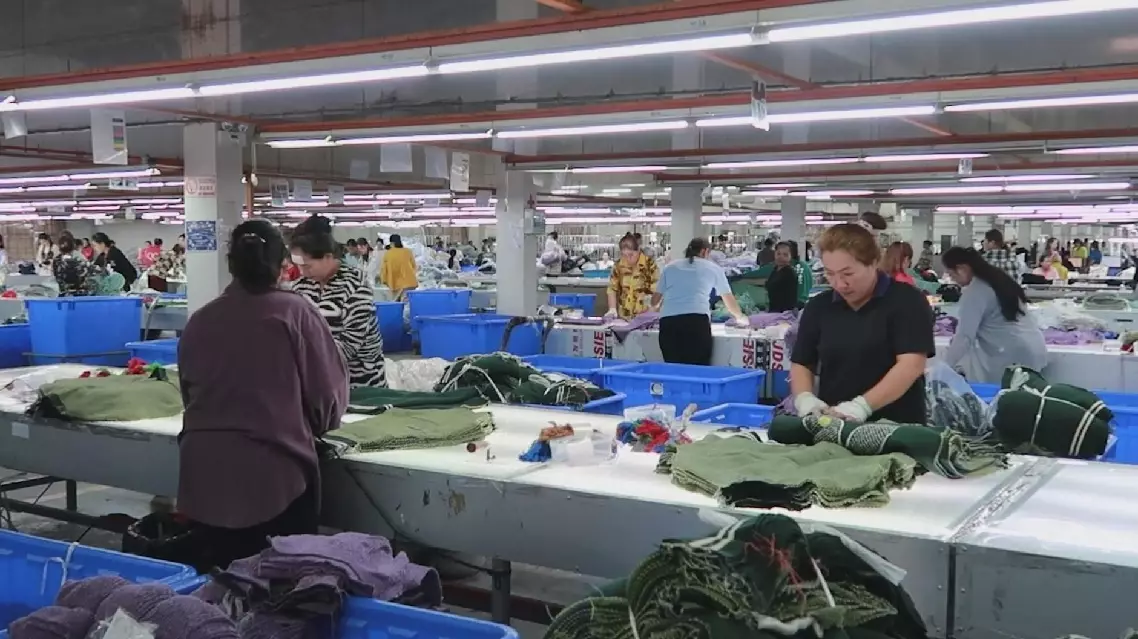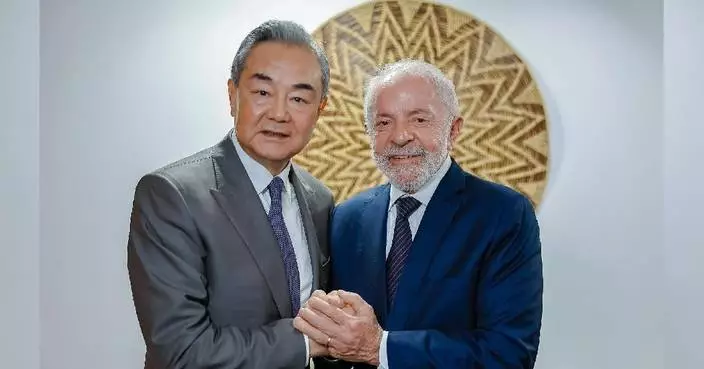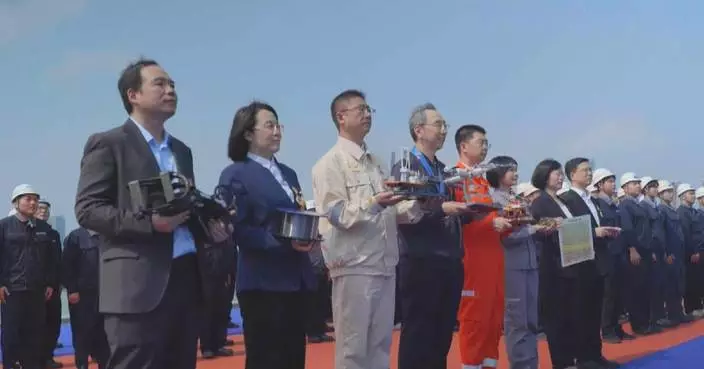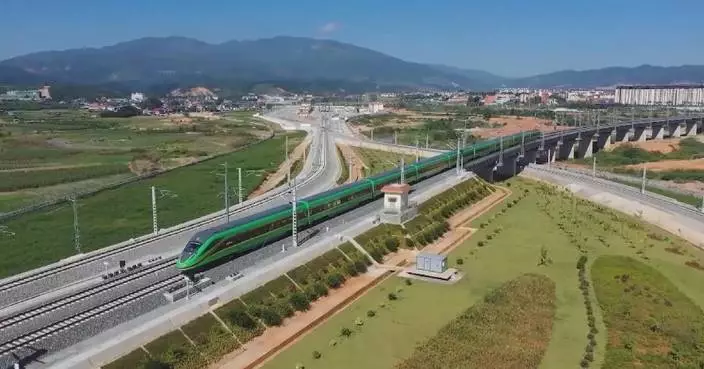As China and Brazil celebrate the 50th anniversary of the establishment of their diplomatic relations, a series of cultural and political events took place this week in Brazil's capital, Brasilia, to mark the occasion, where attendees expressed their expectations for closer bilateral relations in both political and cultural terms.
The vibrant colors and movements of Chinese performing arts were on display in Brasilia on Wednesday to mark the anniversary, with about 80 artists from China performing at this cultural event.
"I think the most important thing between these relations, not only commercial relations that we have between Brazil and China, is people-to-people [interaction]. So, of course, it's important to show this relationship not only [in commercial terms], but also [through] cultural relationship between Brazil and China," said Thomas Law, president of the Brazil-China Sociocultural Institute.
During this event, audience members got to see examples of traditional Chinese dances performed by Beijing's Dance Academy, representing six of the 56 ethnic groups officially recognized across China.
Another highlight was a performance by the Zhejiang Wu Opera Company on Friday, entitled "A Stroll Through Tradition: Glimpses of China." The group, which has performed in 51 countries, blends traditional plays, music, acrobatic stunts, martial arts, and the always popular Dragon Dance.
"The dances were like really a cultural expression that I had never [seen] before. It was really an amazing experience, and I hope to be able to see it again one day," said Isabela Christo, a student.
"This is part of a relationship across continents. It's really important. It's a way of fostering knowledge of China here in Brazil and also of Brazil in China," said Adriano Cesar, an audience member.
On the political front, Brazil's Parliament held a solemn session on Thursday on the floor of the Chamber of Deputies, where a commemorative medal produced by the Brazilian mint was unveiled to mark the 50 years of diplomatic relations between the two countries.
In 2018, a law passed in Brazil's Parliament established August 15th as the National Chinese Immigration Day, the day that also celebrates the beginning of diplomatic relations with China in 1974.
The Chinese Ambassador to Brazil spoke about the importance and the prospects of China-Brazil relations.
"Deputies and senators are representatives of the people and this House is holding a great event to celebrate this anniversary. It shows the enthusiasm of the entire Brazilian society for these relations between China and Brazil. Let's make the next 50 years even better," said Zhu Qingqiao, Chinese Ambassador to Brazil.
"We saw here in the National Congress a solemn session of tributes but also with a reaffirmation of common commitments to continue on this path," said Daniel Almeida, a Federal Deputy of Brazil.
Brazil's Parliament also organized an exhibition in its building highlighting important milestone in the 50 years of bilateral relations and served guests slices from a richly-decorated 500-kilogram cake to celebrate this important anniversary.

Brazilian capital celebrates 50 years of diplomatic ties with China
U.S. tariffs on Cambodia, which were set at 49 percent, have sparked concerns among the Southeast Asian country's key export industries such as garment manufacturing amid the ensuing economic uncertainties.
On April 2, U.S. President Donald Trump announced the 49 percent "reciprocal tariff" on goods imported from Cambodia, the highest among all countries. Days later, the U.S. reduced the so-called "reciprocal tariff" to 10 percent for 90 days, offering a window period to Cambodia for negotiations with it.
Cambodian businesspeople say the tariffs have the potential to wreak havoc on the country's manufacturing sector, which, according to data from the World Bank, makes up around a fifth of the country's GDP.
"For U.S. manufacturers, definitely, there will be a big impact. If manufacturers are focusing on U.S. products, they are now in the middle. They don't know what they should do at the moment because the tariff now from Cambodia to the U.S. is actually quite high," said Dr. Ben Li, a Hong Kong investor in Cambodia and Chairman of the Cambodia Chinese Commerce Association.
Nevertheless, Li sees the tariff hike as an opportunity to export more Cambodian goods to the European Union, where a majority of Cambodian exports enjoy duty-free status.
"I always say there will be a light (at the end of the tunnel.) Even now, the U.S. tariff is so high, it's going to be so high after 90 days, we don't know. But, there's still a big market to Japan or to the European Union. There's still a big opportunity there," he said.
The Cambodian investor also believes the development of major infrastructure projects will help support Cambodia's economy.
"Especially the new canal and then the new airport, and the railways which connect to China. I believe once the logistics and infrastructure are built up, it can help the whole country's economy. By reducing the transportation costs, it can also mitigate the tariff costs," he said.
Cambodia and the U.S. held their first tariff negotiations on April 16, with more expected to follow. Local experts said the stakes are high for the country's workers.
"If this negotiation fails, there will be a significant impact. It will include the garment and travel goods sector. These sectors consist of about 1,068 factories and 930,000 workers. The income generated from these sectors is about 3 billion dollars per year. So it would significantly impact Cambodia's economy, jobs and incomes," said Chey Tech, a socio-economic research and development consultant from Dynamic Alliance Consulting.
Despite the potential risks, Tech expressed his optimism about a positive outcome, citing Cambodian Prime Minister Hun Manat's letter to Trump on April 4.
"The Prime Minister's letter confirmed that Cambodia would reduce the tariff rate for U.S. goods to 5 percent. Second, Cambodia is the least developed country. Third, Cambodia produces goods that the developed countries won't produce. We asked whether the U.S. would be able to produce these low-cost products. It cannot," said Tech.
In 2024, Cambodia exported goods of 9.9 billion dollars to the U.S., making it the country's largest market, accounting for 37 percent of Cambodia's total exports.

49-percent US tariffs sparks worry among Cambodia's key export industries




















































